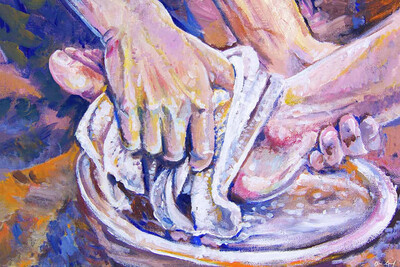Maundy Thursday
Paul writes to the Corinthians, “For I received from the Lord what I also handed on to you.” He refers to the institution of the Lord’s supper, but the pattern of receiving and handing on applies to so much more in Christian faith and practice: We hand on the faith, hope, love, and understanding we have received. Conversely, we cannot give what has not first been given to us.
Jesus’ first disciples learn this in the last supper according to John. As John 13 begins, Jesus’ “hour” has arrived. At the meal Jesus washes his disciples’ feet and commands them to pass on the loving service to others: “You also should do as I have done to you.” Jesus too hands on to his disciples what he has first received from God: “As the Father has loved me, so I have loved you” (John 15:9). Jesus does not just command servant love, nor does he merely exemplify it. Through his death and resurrection, Jesus enables his followers to love. Jesus’ example of servant love in washing his disciples’ feet literally grounds them for all that is to come and all that disciples are called to do.
This potent image helps us interpret Jesus’ giving of himself in death, and it undergirds the community of loving service formed in Christ. As Peter discovers, Jesus’ disciples must first receive from Jesus in order to have a “share” with him (John 13:8). Then disciples are called to follow him in giving themselves away—not just for the sake of serving, but also for the sake of being drawn into relationship with Jesus and with his Father. Through that relationship we are drawn into the community of disciples, where we receive and hand on Christ’s meal and the gift of servant love.

